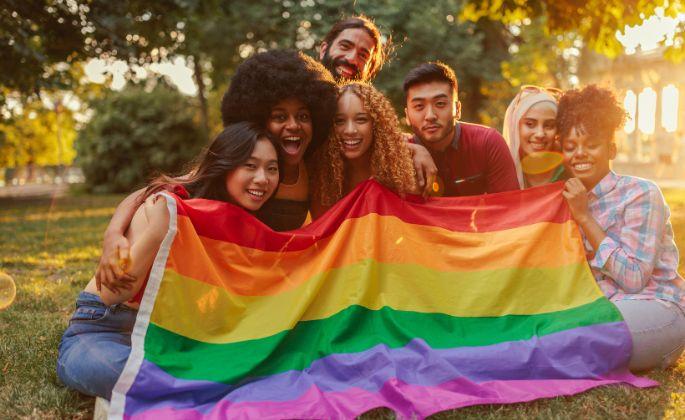This blog was written by a Behavioral Health Specialist at our St. Louis Park, MN treatment center for adults and adolescents.
I want to take a moment to say happy Pride month. I hope you feel recognized and celebrated, and may this June set the precedent for how you are acknowledged year-round.
1. PRIDE month is a celebration of all queer-identifying people!
The LGBTQIA+ community has grown tremendously in recent years, both in terms of representation and visibility. Alongside the growth in numbers, the community has also continuously diversified. While gender and sexual identities have become more represented, it is crucial that mental and physical health care also account for this diversity. Pride month is not only a time to celebrate the LGBTQIA+ community, but also a time for those who don’t identify within the community to expand their understanding of Pride. Your peers, family, co-workers, healthcare providers, and others you encounter all play a role in combatting stigma and marginalization of the queer community. Further, they can play a vital role in supporting one’s recovery journey. My intention here is to generate greater awareness of eating disorder development and validate the importance of recovery for LGBTQIA+ identifying readers.
2. Members of the LGBTQIA+ community are more likely to develop an eating disorder than their heterosexual and cisgender peers.
Research studying the connection between the LGBTQIA+ community and eating disorders is quite limited, but with the research we do have, it is clear this community is at an increased risk for developing an eating disorder. If you consider the amount of risk factors in relation to body image — gender identity, interpersonal relationships, and sexuality — it is less than surprising that queer-identifying folks are more commonly experiencing disordered eating.
3. Despite various stereotypes and body image ideals, no queer identity has a “correct” look.
The pressures and expectations that contribute to disordered eating and body-changing behaviors appear to come from a variety of sources. Many of you have likely heard of body ideals or gender attitudes that are considered the “norm” within each queer subgroup. Whether it is weight, shape, size, femininity, masculinity, role, or relational norms, the world has various assumptions and stereotypes about the LGBTQIA+ community. To be clear, it is not your fault that these standards have been created or that you feel intense pressure to meet them. Being that these expectations are often related to physical attributes, eating disorder thoughts and behaviors may feel that they serve a purpose in achieving the “correct” identity or appearance. While this may feel productive or affirming in the moment, these behaviors are dangerous. Also, you are worthy of exploring and embracing your identity, even when it feels “out of the norm.” Alongside the increased eating disorder diagnoses within the community, we must also address the unhelpful standards held for queer folks.
4. Eating disorder care should be inclusive and supportive for all humans.
It can be helpful to counter statements enforcing queer body and identity ideals with neutral and inclusive language, and yet, this doesn’t lessen the pre-existing impact of these stereotypes. You deserve care and recovery for the behavior you learned from these negative messages. Though there are various barriers to receiving affirmative care and challenges with deconstructing ideals, we must do our best to take action. So how do you advocate for your needs and beliefs despite previous dysphoric conversations or fear of discrimination? Of course, the answer is always easier said than done. As research and resources continue to grow, know that there is space for you and your story. The paradox of identity and body is far from simple, and you have the choice to explore gender and sexuality as a part of your recovery. Each person, queer-identifying or not, is entitled to individualized mental health care. Further, it is on us as care providers to cultivate a safe and inclusive space for all.
5. Recovery from an eating disorder is for you!
Whether you are seeking recovery now or in the future, know that you are also encouraged to build a strong support system. Beyond eating disorder treatment and traditional mental health care, the people you surround yourself with play a crucial role in cultivating authenticity and self-esteem. Think of your values and when you feel most seen and supported. Additionally, encourage others to do their own research and exploration of LGBTQIA+ language and resources. Expecting others to respect you and listen to your experiences is not asking too much. The queer community has been excluded and maltreated for too long, and I hope that you do find peace with your body and identity.
I see you. The Emily Program sees you. We are here to listen, to learn, to validate, and to support — everyone.
